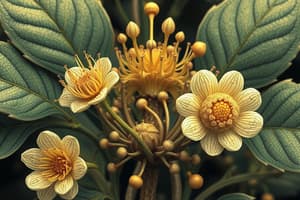Podcast
Questions and Answers
What is the main function of roots in plants?
What is the main function of roots in plants?
- Anchoring the plant and absorbing water (correct)
- Reproduction
- Photosynthesis
- Transporting nutrients to leaves
Which of the following is a characteristic of the plant kingdom?
Which of the following is a characteristic of the plant kingdom?
- Exoskeleton for protection
- Chlorophyll for photosynthesis (correct)
- Gills for breathing
- Hemoglobin for respiration
What is the primary function of leaves in plants?
What is the primary function of leaves in plants?
- Absorbing water from the soil
- Photosynthesis (correct)
- Storing food
- Anchoring the plant
Which plant structure is responsible for the transport of water and nutrients?
Which plant structure is responsible for the transport of water and nutrients?
What is the primary focus of the study of plant morphology?
What is the primary focus of the study of plant morphology?
Which plant structure is primarily responsible for the production of food through photosynthesis?
Which plant structure is primarily responsible for the production of food through photosynthesis?
What is the main function of the floral parts in flowering plants?
What is the main function of the floral parts in flowering plants?
What is the primary role of roots in providing stability to plants?
What is the primary role of roots in providing stability to plants?
Which region of the root is responsible for the growth of the root in length?
Which region of the root is responsible for the growth of the root in length?
What is the primary function of the delicate, thread-like structures called root hairs?
What is the primary function of the delicate, thread-like structures called root hairs?
What is the role of the root cap on the apex of the root?
What is the role of the root cap on the apex of the root?
Where does meristematic activity occur in the root?
Where does meristematic activity occur in the root?
What happens to the cells proximal to the region of elongation?
What happens to the cells proximal to the region of elongation?
Flashcards are hidden until you start studying
Study Notes
Functions of Roots
- Main function of roots: anchor the plant into the ground, providing stability and support.
- Roots absorb water and nutrients from the soil, essential for plant growth and health.
Characteristics of the Plant Kingdom
- Organisms in the plant kingdom are primarily autotrophic, meaning they produce their own food through photosynthesis.
- Plant cells contain chloroplasts and a rigid cell wall made of cellulose.
Functions of Leaves
- Primary function of leaves: site of photosynthesis where plants convert sunlight into energy.
- Leaves have a large surface area to maximize light absorption.
Transport Structures
- Xylem is responsible for the transport of water and dissolved nutrients from the soil to different parts of the plant.
- Phloem transports sugars produced during photosynthesis to various parts of the plant.
Study of Plant Morphology
- Primary focus of plant morphology: the study of the form and structure of plants, including leaves, stems, roots, and reproductive structures.
Photosynthesis Structures
- Chloroplasts, located primarily in the leaves, are responsible for the production of food (glucose) through photosynthesis.
Floral Parts Function
- Floral parts in flowering plants mainly serve the purpose of reproduction, facilitating pollination and the development of seeds.
Root Stability Role
- Roots provide stability to plants by securing them in the soil, helping prevent uprooting by wind and water.
Root Growth Region
- The region of the root responsible for elongation is called the zone of elongation, where cells expand and contribute to root length.
Root Hairs Function
- Delicate, thread-like structures called root hairs increase the surface area for absorption of water and nutrients.
Root Cap Role
- The root cap protects the growing tip of the root and aids in the penetration of the soil as the root grows.
Meristematic Activity in Roots
- Meristematic activity occurs in the root tip, in the area called the apical meristem, where new cells are produced for growth.
Cell Changes Near Elongation
- Cells proximal to the region of elongation begin to differentiate and mature, leading to the development of specialized root tissues.
Studying That Suits You
Use AI to generate personalized quizzes and flashcards to suit your learning preferences.




